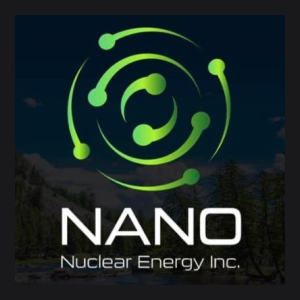NANO Nuclear and MIT’s Department of Nuclear Science and Engineering Launch Advanced Irradiation Study to Investigate Salt-Based Thermal Storage for Nuclear Applications
Rhea-AI Summary
NANO Nuclear Energy (NASDAQ: NNE) has launched a major two-year irradiation testing program in collaboration with MIT's Department of Nuclear Science and Engineering. The study, backed by over $500,000 in R&D investment from NANO Nuclear, will investigate the thermal and radiolytic behavior of nitrate molten salts ("solar salts") for nuclear applications.
Under the supervision of Prof. Koroush Shirvan, researchers will use MIT's Gammacell 220F Co-60 irradiator to study salt materials' behavior under gamma irradiation. The project employs advanced diagnostics including magnetic sector residual gas analyzer, laser flash analysis, and post-irradiation spectroscopic techniques to assess off-gassing behavior, thermal degradation, and material stability.
Set to conclude in 2027, this research aims to enhance understanding of molten salts in radiation environments, crucial for developing next-generation reactor designs and improving safety and performance models.
Positive
- Significant R&D investment of over $500,000 demonstrates commitment to technological advancement
- Partnership with prestigious MIT enhances research credibility and expertise
- Study results will directly impact reactor development and design processes
- Research conducted without nuclear materials reduces safety risks and regulatory hurdles
Negative
- Long research timeline with results not expected until 2027
- Significant R&D expenditure with no immediate revenue generation
News Market Reaction
On the day this news was published, NNE declined 3.46%, reflecting a moderate negative market reaction.
Data tracked by StockTitan Argus on the day of publication.
New York, N.Y., May 20, 2025 (GLOBE NEWSWIRE) -- NANO Nuclear Energy Inc. (NASDAQ: NNE) (“NANO Nuclear” or the “Company”), a leading advanced nuclear technology and energy company, today announced the launch of a major irradiation testing program in collaboration with the Massachusetts Institute of Technology (MIT) Department of Nuclear Science and Engineering. The two-year collaboration will investigate the thermal and radiolytic behavior of nitrate molten salts, commonly referred to as "solar salts", to assess their viability in advanced nuclear energy systems for thermal energy storage and cooling applications.
Funded by NANO Nuclear through over
“We are proud to support this world-class irradiation study at MIT,” said Jay Yu, Founder and Chairman of NANO Nuclear. “Understanding how molten salts perform under radiation is essential to unlocking next-generation reactor designs, and this facility gives us the capabilities to do that without the use of any nuclear materials.”
While molten nitrate salts are widely used in solar thermal energy systems, the knowledge of these materials’ behavior under the ionizing radiation conditions representative of nuclear environments is relatively scarce. This collaboration aims to fill that critical knowledge gap by assessing both the chemical and thermophysical performance of the salts during and after irradiation.
Using a suite of cutting-edge diagnostics, including a magnetic sector residual gas analyzer (RGA), laser flash analysis, and post-irradiation spectroscopic techniques, MIT researchers will measure off-gassing behavior, thermal degradation, and long-term material stability. The results will inform system design for microreactors that utilize molten salts for heat transfer or energy storage, improving the accuracy and reliability of safety and performance models.
“This project offers an exciting opportunity to characterize molten nitrate salts in radiation environments with a level of precision not previously achieved,” said Dr. Koroush Shirvan, Principal Investigator at MIT. “We’re using real-time diagnostics, high-temperature test rigs, and modern analytical techniques to generate data that can have immediate impact on next-generation reactor development.”
The results of this study will feed directly into the engineering and design processes and could also prove useful for other clean energy applications, including industrial process heat and off-grid energy storage.
“We are thrilled to see this groundbreaking research move forward with MIT,” said Professor Ian Farnan, Lead of Nuclear Fuel Cycle, Radiation and Materials of NANO Nuclear. “The ability to assess salt performance in radiation fields without reliance on operating reactor gives us unprecedented flexibility and speed in advancing the development of our reactor systems.”
The project is expected to conclude in 2027, with quarterly updates and final data delivery coordinated between MIT and NANO Nuclear’s engineering teams. As NANO Nuclear continues to expand its operations, the Company remains committed to developing cutting-edge nuclear solutions that redefine the global energy landscape.
About NANO Nuclear Energy, Inc.
NANO Nuclear Energy Inc. (NASDAQ: NNE) is an advanced technology-driven nuclear energy company seeking to become a commercially focused, diversified, and vertically integrated company across five business lines: (i) cutting edge portable and other microreactor technologies, (ii) nuclear fuel fabrication, (iii) nuclear fuel transportation, (iv) nuclear applications for space and (v) nuclear industry consulting services. NANO Nuclear believes it is the first portable nuclear microreactor company to be listed publicly in the U.S.
Led by a world-class nuclear engineering team, NANO Nuclear’s reactor products in development include patented KRONOS MMR™ Energy System, a stationary high-temperature gas-cooled reactor that is in construction permit pre-application engagement U.S. Nuclear Regulatory Commission (NRC) in collaboration with University of Illinois Urbana-Champaign (U. of I.), “ZEUS”, a solid core battery reactor, and “ODIN”, a low-pressure coolant reactor, and the space focused, portable LOKI MMR™, each representing advanced developments in clean energy solutions that are portable, on-demand capable, advanced nuclear microreactors.
Advanced Fuel Transportation Inc. (AFT), a NANO Nuclear subsidiary, is led by former executives from the largest transportation company in the world aiming to build a North American transportation company that will provide commercial quantities of HALEU fuel to small modular reactors, microreactor companies, national laboratories, military, and DOE programs. Through NANO Nuclear, AFT is the exclusive licensee of a patented high-capacity HALEU fuel transportation basket developed by three major U.S. national nuclear laboratories and funded by the Department of Energy. Assuming development and commercialization, AFT is expected to form part of the only vertically integrated nuclear fuel business of its kind in North America.
HALEU Energy Fuel Inc. (HEF), a NANO Nuclear subsidiary, is focusing on the future development of a domestic source for a High-Assay, Low-Enriched Uranium (HALEU) fuel fabrication pipeline for NANO Nuclear’s own microreactors as well as the broader advanced nuclear reactor industry.
NANO Nuclear Space Inc. (NNS), a NANO Nuclear subsidiary, is exploring the potential commercial applications of NANO Nuclear’s developing micronuclear reactor technology in space. NNS is focusing on applications such as the LOKI MMR™ system and other power systems for extraterrestrial projects and human sustaining environments, and potentially propulsion technology for long haul space missions. NNS’ initial focus will be on cis-lunar applications, referring to uses in the space region extending from Earth to the area surrounding the Moon's surface.
For more corporate information please visit: https://NanoNuclearEnergy.com/
For further NANO Nuclear information, please contact:
Email: IR@NANONuclearEnergy.com
Business Tel: (212) 634-9206
PLEASE FOLLOW OUR SOCIAL MEDIA PAGES HERE:
NANO Nuclear Energy LINKEDIN
NANO Nuclear Energy YOUTUBE
NANO Nuclear Energy X PLATFORM
Cautionary Note Regarding Forward Looking Statements
This news release and statements of NANO Nuclear’s management in connection with this news release contain or may contain “forward-looking statements” within the meaning of Section 21E of the Securities Exchange Act of 1934, as amended, and the Private Securities Litigation Reform Act of 1995. In this context, forward-looking statements mean statements related to future events, which may impact our expected future business and financial performance, and often contain words such as “expects”, “anticipates”, “intends”, “plans”, “believes”, “potential”, “will”, “should”, “could”, “would” or “may” and other words of similar meaning. In this press release, forward-looking statements relate to, among other things, the anticipated benefits to NANO Nuclear of its collaboration with MIT, as well as the nature and timing of the research described herein. These and other forward-looking statements are based on information available to us as of the date of this news release and represent management's current views and assumptions. Forward-looking statements are not guarantees of future performance, events or results and involve significant known and unknown risks, uncertainties and other factors, which may be beyond our control. For NANO Nuclear, particular risks and uncertainties that could cause our actual future results to differ materially from those expressed in our forward-looking statements include but are not limited to the following: (i) risks related to our U.S. Department of Energy (“DOE”) or related state or non-U.S. nuclear fuel licensing submissions, (ii) risks related the development of new or advanced technology and the acquisition of complimentary technology or businesses, including difficulties with design and testing, cost overruns, regulatory delays, integration issues and the development of competitive technology, (iii) our ability to obtain contracts and funding to be able to continue operations, (iv) risks related to uncertainty regarding our ability to technologically develop and commercially deploy a competitive advanced nuclear reactor or other technology in the timelines we anticipate, if ever, (v) risks related to the impact of U.S. and non-U.S. government regulation, policies and licensing requirements, including by the DOE and the U.S. Nuclear Regulatory Commission, including those associated with the recently enacted ADVANCE Act, and (vi) similar risks and uncertainties associated with the operating an early stage business a highly regulated and rapidly evolving industry. Readers are cautioned not to place undue reliance on these forward-looking statements, which apply only as of the date of this news release. These factors may not constitute all factors that could cause actual results to differ from those discussed in any forward-looking statement, and NANO Nuclear therefore encourages investors to review other factors that may affect future results in its filings with the SEC, which are available for review at www.sec.gov and at https://ir.nanonuclearenergy.com/financial-information/sec-filings. Accordingly, forward-looking statements should not be relied upon as a predictor of actual results. We do not undertake to update our forward-looking statements to reflect events or circumstances that may arise after the date of this news release, except as required by law.








